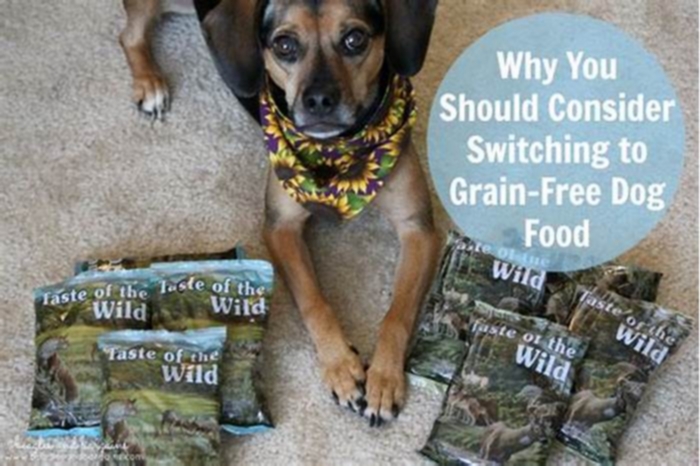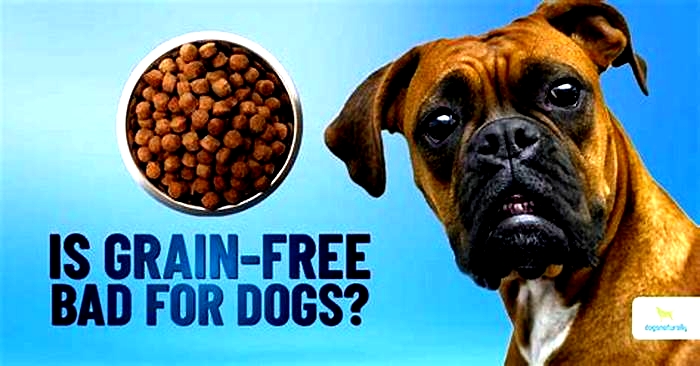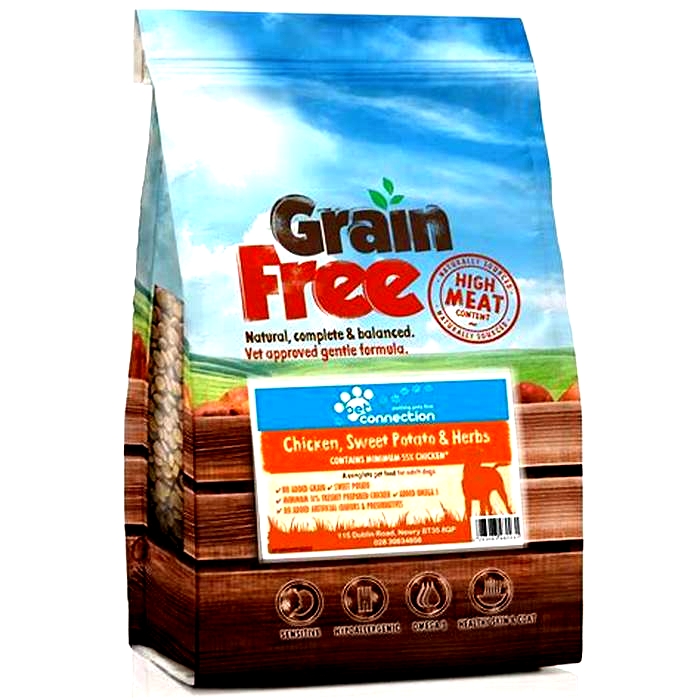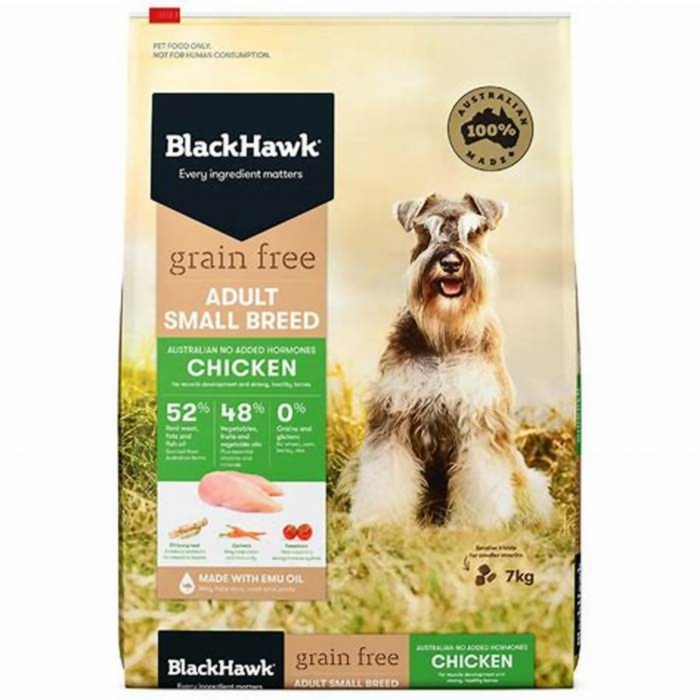Is grain free better for dogs

Grain-free for dogs is good - fad, fact or fiction?
In recent years weve seen a growing trend for owners to switch their dogs to a grain-free diet. The internet is awash with conflicting information of varying quality which can make it very difficult for us as owners to know what is the best thing to do for our pets. Id like to take the time to have a look at why people feel they want to change to grain-free and whether its actually a good idea.
Why do owners want a grain-free food for their dog?
One of the underlying reasons that pet owners are interested in grain-free food is that they see dogs like their wolfy-ancestors and truly believe that we should feed them as such. There are many problems with this assumption. You will often hear that dogs are carnivores therefore they should only eat meat. This is incorrect. Dogs are classed as carnivores anatomically but they are dietary omnivores like bears and are perfectly capable of eating both plants and meat. Lets not forget that the beautiful, iconic giant panda is classed as a carnivore that is 100% vegetarian in eating habits!
Dogs evolved alongside us over 20-40,000 years. In this time they started to eat our scraps and leftovers and we know from genetic research that dogs are over 99% able to digest carbohydrates such as grains. There are literally millions of stray dogs round the world surviving on scraps and very little meat. Wolves do not have the same genetic makeup.
Another crucial difference is volume of food and calorie needs. Wolves need about 3-4 times the calories of an average sized dog so they eat very large volumes of food. This ensures adequate levels of vitamins and minerals. If we fed dogs in this way they would either be morbidly obese or drastically deficient in certain nutrients.
Many owners have also heard scary sounding things about grains like that they are simply used as cheap fillers. Do we see cereals and wholegrains that we encourage ourselves and our children to eat in this way? The fact is that for dogs and humans alike, grains are a great source of vitamins and fibre. They also supply what we call prebiotic fibre. This is the type of fibre that feeds your healthy gut bacteria which in turn keep your gut cells healthy and active.
What about grain allergy?
One reason that some owners want a grain-free food is because they are worried about allergies. True food allergies are rare in dogs and allergies to proteins in plants are not very common. A small number of dogs are allergic to certain foods, however, and the most common ones in dogs are beef, chicken, dairy and wheat.
Gluten Sensitivity
Some owners worry about gluten in pet foods. Gluten sensitivity is incredibly rare in dogs and has only been found in a small number of Irish Setters as an inherited disease.
So is grain-free necessarily bad?
As with all food and dietary decisions this depends on the diet you use. Dogs can certainly do well on a grain-free diet but it is essential that it is balanced and complete. This means that it still meets all their dietary needs in the right proportions. Some owners have heard about a certain heart disease (called dilated cardiomyopathy or DCM for short) being caused by grain-free foods. At the time of writing this is not proven and you can read more from the PFMA (Pet Food Manufacturers Association) about the ongoing research.
In summary
The most important thing when it comes to feeding dogs is that they have a balanced and complete pet food that is suitable for their lifestage. Simply removing one ingredient or trying to balance meals at home is fraught with danger and can lead to severe nutritional excesses as well as deficiencies. Dogs are perfectly adapted to a diet with meat and plants and are entirely capable of digesting carbohydrates.
Many veterinarians and pet owners have healthy and happy dogs eating foods with grains. Unless there is a medical reason, high quality complete and balanced pet foods with grains are fine for dogs. Grains are a good source of nutrients and help make a balanced diet. If you feel you really do want a grain-free pet food, talk to your vet about the most reputable ones to choose from and always make the change slowly over a number of days to avoid digestive upsets.
Contributor Bio

Dr Emma Milne qualified as a vet in 1996. She worked in small animal practice for 12 years and as a clinical nutrition advisor for seven years. She is well known for her animal welfare work and has written ten books on pet animals.
What Dog Owners Need to Know About the FDAs Grain-Free Diet Alert and DCM
TheFDA is investigatingpotential links between canine heart disease and diet specifically grain-free dog food diets.Weve compiled the information you need to know to understand this ongoing investigation.
Why Is the FDA Investigating Grain-Free Dog Food?
It is easy to panic anytime we see an FDA headline about pet food. After all, keeping our dogs healthy is essential to us, and we know that diet can make a big difference in a dogs well-being. We reached out to Dr. Jerry Klein, the Chief Veterinary Officer of the AKC, to hear his thoughts on the ongoing FDA investigation.
The FDA is investigating a potential dietary link between canine dilated cardiomyopathy (DCM) and dogs eating certain grain-free dog foods. The foods of concern are those containing legumes such as peas or lentils, other legume seeds, or potatoes listed as primary ingredients. The FDA began investigating this matter after it received reports of DCM in dogs that had been eating these diets for a period of months to years. DCM itself is not considered rare in dogs, but these reports are unusual because the disease occurred in breeds of dogs not typically prone to the disease.
Between January 1, 2014 and April 30, 2019, the FDA received 524 reports of DCM (515 dogs, 9 cats), and most reports were submitted after the FDAs first public alert in July 2018. The total number of pets affected is greater than 524 because some reports included multi-pet households.
What is Canine Heart Disease or Dilated Cardiomyopathy (DCM)?
Dilated cardiomyopathy (DCM) is a type of canine heart disease that affects the heart muscle. The hearts of dogs with DCM have a decreased ability to pump blood, which often results in congestive heart failure.
Some breeds, especially large and giant breeds, have a predisposition to DCM. These breeds include Doberman Pinschers, Great Danes, Newfoundlands, Irish Wolfhounds, and Saint Bernards. While DCM is less common in medium and small breeds, English and American Cocker Spaniels are also predisposed to this condition.
The reports submitted to the FDA span a wide range of breeds, including many without a known genetic predisposition. When early reports from the veterinary cardiology community indicated that recent, atypical cases in breeds like Golden Retrievers, Labrador Retrievers, Whippets, Bulldogs, and Shih Tzus all consistently ate grain alternatives in their diets, the FDA took notice.
Should you be Concerned About Grain-Free Dog Food?
In the FDAs July 2019 update on diet and canine heart disease, they examined labels of dog food products reported in DCM cases to determine whether the foods were grain-free (defined as no corn, soy, wheat, rice, barley or other grains), and whether the foods contained peas, lentils, chickpeas, beans, or potatoes (including sweet potatoes). Their report states that more than 90 percent of foods reported in DCM cases were grain-free, 93 percent of reported foods contained peas and/or lentils, and 42 percent contained potatoes/sweet potatoes.
According to Dr. Klein, At this time, there is no proof that these ingredients are the cause of DCM in a broader range of dogs, but dog owners should be aware of this alert from the FDA. The FDA continues to work with veterinary cardiologists and veterinary nutritionists to better understand the effect, if any, of grain-free diets on dogs.
The FDAs July 2019 update includes the names of dog food brands that were named 10 times or more in reports submitted through April 30, 2019. Most reports were for dry dog food, but raw, semi-moist and wet foods were all represented.
- Acana (67 reports)
- Zignature (64 reports)
- Taste of the Wild (53 reports)
- 4Health (32 reports)
- Earthborn Holistic (32 reports)
- Blue Buffalo (31 reports)
- Natures Domain (29 reports)
- Fromm (24 reports)
- Merrick (16 reports)
- California Natural (15 reports)
- Natural Balance (15 reports)
- Orijen (12 reports)
- Natures Variety (10 reports)
- Nutrisource (10 reports)
- Nutro (10 reports)
- Rachael Ray Nutrish (10 reports)
In the Dec. 1 version of theJournal of the American Veterinary Medical Association, Lisa M. Freeman, DVM, Ph.D., DACVN, provided an update to the research on DCM and emphasized the issue is not just grain-free diets. She calls the suspected diets BEG diets (boutique companies,exotic ingredients, or grain-free diets).
The apparent link between BEG diets and DCM may be due to ingredients used to replace grains in grain-free diets, such as lentils or chickpeas, but also may be due to other common ingredients commonly found in BEG diets, such as exotic meats, vegetables, and fruits, Freeman wrote.
Freeman emphasizes that although there appears to be an association between DCM and BEG diets, the relationship has not yet been proven, and other factors may be equally or more important.
The FDA encourages pet owners to report cases of dogs and cats with DCM that they suspect to be linked to diet by using the Safety Reporting Portal.
As a general rule of thumb, the best thing you can do for your dogs dietary health is to consult your veterinarian. Togetheryou can weigh the pros and cons of your dogs diet, consider whether grain-inclusive dog food or grain-free dog food are right for your dog, and, if necessary, monitor your dog for signs of DCM.
Is Grain-Free Dog Food Bad?
It was a routine vet visit for Oliver, Julie Carters 3-year-old Golden Retriever. At least, it was until the vet listened to Olivers heart and uttered the sentence that would change her life: He has a heart murmur.
It was February 2018, and Carter had also brought in an interesting article from the Morris Animal Foundation website noting a disturbing upswing in the number of Goldens diagnosed with dilated cardiomyopathy (DCM). These dogs had in common two things: They had a deficiency of taurine, an amino acid, in their blood, and they were fed boutique dog foods from small companies often with unusual, grain-free, or legume-rich ingredient lists. Oliver was eating such a diet. He had a low taurine level. And he had DCM.
Oliver, now under the care of a veterinary cardiologist, was immediately placed on a mainstream diet containing grain and was given taurine supplements as well as heart medications. He remained symptom-free until one day, without warning, he suffered a fatal arrhythmia while walking across the kitchen floor. It was August 2018, six months after his diagnosis, and just five days after celebrating his 4th birthday.
DCM is a serious disease of the heart muscle that can ultimately lead to death. It occurs more often in large breeds, and in some breeds, its thought to have a genetic component. It also typically occurs in middle-aged to older dogs. Goldens are not considered an at-risk breed for DCM in general, but they are at risk for taurine deficiency.
Taurine and Heart Disease
Taurine, an amino acid thats abundant in meat, was implicated in cases of cat DCM 30 years ago. It turned out commercial cat foods didnt contain sufficient taurine. When taurine was added to the food, DCM in cats basically disappeared.
Taurine immediately became suspect in dog DCM, but relatively few instances of taurine-deficient DCM have been identified in dogs. Certain diets, however, notably those high in lamb, rice bran, or fiber (especially beet pulp) and very lowprotein diets have been associated with canine taurine deficiency.
Fast-forward to 2018. Veterinary cardiologists started noticing higher than usual numbers of dogs with DCM. At Tufts University, Lisa Freeman, DVM, Ph.D., DACVIM, a board-certified veterinary nutritionist with a research emphasis on nutritional effects of heart disease, reported an alarming number of these dogs were eating what she called BEG (boutique, exotic-ingredient, or grain-free) diets.
Boutique diets are produced by small companies without nutritional testing facilities. Exotic-ingredient diets use unusual sources, such as kangaroo or duck, which have not received extensive testing more common sources such as chicken or beef have. Grain-free diets replace grains such as rice and corn with potatoes or legumes (beans, peas, and lentils) as a carbohydrate source. No study has ever shown grain-free to be superior to grain-inclusive diets.


The FDA Gets Involved
Freeman collaborated with several veterinary cardiologists and alerted the Food and Drug Administration (FDA). In July 2018, the FDA announced it had found sufficient evidence to investigate. In November 2018, Freeman and her collaborators issued a commentary published in the Journal of the American Veterinary Medical Association. It would become one of the most downloaded articles in the history of that publication.
The FDA has since issued several updates. From January 2018 through April 2019, the FDA received reports of 553 dogs with DCM compared with previous years that ranged from zero to three dogs. These included 95 Goldens, 62 mixed-breeds, 47 Labrador Retrievers, 25 Great Danes, and more than 50 additional breeds with more than one report.
The FDA report lists 16 dog-food companies that had 10 or more cases of DCM associated with their food, but many more foods are involved. The brands themselves are probably not the important part of the report, but rather what these foods have in common.
When the diets were examined, no protein source stood out as being over-represented. In fact, the most common proteins were chicken, lamb, and fish, although some contained unusual proteins such as kangaroo, bison, or duck. More than 90 percent of the diets were grain-free, and 93 percent of the diets contained peas or lentils. A far smaller proportion included potatoes. When these foods were tested, they contained the same average percentage of protein, fat, taurine, and taurine precursors as grain-containing products.
Joshua Stern, DVM, Ph.D., DACVIM, was one of the original veterinary cardiologists who noticed the increase in DCM cases in Golden Retrievers. Since then, Stern, of the University of California, Davis, School of Veterinary Medicine, has been studying Goldens with DCM and taurine deficiency. In an unpublished study of 24 Goldens with confirmed DCM and low taurine, all but one dog had substantial cardiac improvement after a diet change and the addition of supplemental taurine. All of the dogs had been eating BEG diets at the time DCM was diagnosed.
What Now?
While many dogs eating BEG diets do not appear to be developing DCM, veterinary cardiologists are recommending feeding foods made by well-established manufacturers. These conduct feeding trials and use standard ingredients such as chicken, beef, rice, corn, and wheat. They point to five American manufacturers: Purina, Hills, Royal Canin, Iams, and Eukanuba.
Critics contend that the number of reported dogs compared to the number eating these diets hardly constitutes an epidemic and that no controlled feeding trials exist that compare DCM rates in BEG versus non-BEG diets. However, most cases of DCM still go unreported, and the smaller BEG companies dont conduct feeding trials.
At least one study is now underway. Researchers at the University of Florida College of Veterinary Medicine have begun an AKC Canine Health Foundation-funded study to determine if diet type has an effect on the echocardiographic, taurine values, or blood biomarker values of outwardly healthy dogs. Dogs with abnormalities will be offered a diet change and then re-checked for a year afterward. Two at-risk breeds (Goldens and Doberman Pinschers) and two not-at-risk breeds (Whippets and Miniature Schnauzers) will participate.
We are working hard to help answer this question as soon as possible, says lead researcher Darcy Adin, DVM, DACVIM. This study will not answer every question but hopefully will address the issue of whether nutritionally associated DCM is real, if so what types of foods are associated with it, whether taurine deficiency plays a role, whether blood cardiac biomarkers may be useful for detection, and whether improvement can be seen after nutritional intervention.
Meanwhile, dog owners remain concerned. Thanks to dedicated veterinarians and devoted dog owners, there are excellent resources are available. Several Facebook pages are devoted to the topic; the most popular, Taurine Deficient (Nutritional) Dilated Cardiomyopathy, has more than 100,000 members. Other groups include Taurine Deficiency in Golden Retrievers and the Canine Nutritional DCM Support Group, a support group dedicated to owners who have an affected dog or have lost their dog to DCM. There is also a website.
More than a year after Olivers death, Carter copes with her loss by helping others cope with theirs, and by spreading awareness of the problem. This has prompted many owners to have their dogs hearts checked by a veterinary cardiologist.
But Oliver isnt her only concern. Riley, Carters 9-year-old Golden, has been diagnosed with the same disease. While their cases share several similarities, the most glaring one is the fact that both Oliver and Riley ate the exact same food for several years. a grain-free, limited-ingredient diet loaded with legumes, Carter says. Carter also has a loveable 1-year-old Golden named Finn who has never eaten a BEG diet, nor will he ever be fed one.
Oliver is undoubtedly the best-known DCM victim. Deciding to be proactive and educate others about this life-threatening disease was a quick and easy decision to make, Carter recalls. When Oliver was diagnosed in February 2018, there was very little information accessible to the public about canine nutritional DCM. Shortly after Olivers diagnosis, I dubbed him the Face of Dilated Cardiomyopathy, hoping that putting a face to this horrible disease would get the attention of dog owners and make it easier to educate them.
While Oliver is often recognized as the Face of DCM, he is not alone, says Carter. There are hundreds of other dogs suffering and dying from this preventable disease. I have seen firsthand how many of these heartbroken families are crumbling under the emotional, physical, and financial weight that comes along with this diagnosis.









